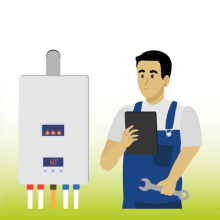21/03/2024
Digital platform work: minimising the risks to seize the opportunities

Digital platform work offers some advantages for workers, but also presents risks to occupational safety and health (OSH). These challenges may not be sufficiently addressed due to a number of reasons, including the relative novelty of this working model, the ongoing debate about specific regulation and its wide variety in terms of industries, workers, types of tasks carried out and locations. Digital platform work is the first priority area of the 2023-25 Healthy Workplaces Campaign and EU-OSHA is dedicating these months to exploring and sharing resources on the topic.
Advantages of platform work
Digital platforms offer a work model with the potential to increase labour market participation and create opportunities for entrepreneurial activities. This is particularly beneficial for certain groups of workers, including individuals who may encounter obstacles in traditional employment settings, such as migrants, ethnic minorities, workers with disabilities or chronic illnesses and younger people, as well as those located in areas with limited job opportunities.
These platforms provide a high degree of flexibility, generally allowing workers to choose the amount and timing of the work and, for tasks conducted online, even the location. Consequently, this type of work can be combined with other occupations to obtain an additional source of income. It also facilitates the involvement in the labour market of individuals with caregiving responsibilities like childcare or elderly care.
This employment arrangement has the potential to improve work-life balance for many people, given their flexibility based on demand, need and availability. It also promotes the development of skills and work experience that may lead to new job opportunities.
Risks and challenges that need to be addressed
The wide diversity of digital platform work, that covers multiple sectors and people, accounts for some of its challenges. Some of these risks overlap with those faced by workers performing similar tasks outside the platform economy, such as prolonged sitting, traffic accidents for delivery and taxi drivers, exposure to dangerous chemicals for cleaners and handypersons, as well as slips and falls. However, platform workers are additionally exposed to risks directly associated with the nature and conditions of platform work itself.
One of these challenges is algorithmic management, where work scheduling in workplaces like warehouses or grocery stores is automated based on factors such as employee performance. These digital systems impact work allocation and compensation, as well as reward and punishment systems, while collecting worker data. Combined with the general lack of algorithmic transparency, this can lead to increased digital monitoring and surveillance, resulting in stress and other work-related psychosocial issues related to job insecurity. Other risks of digital platform work stem from its isolated nature, often carried out in solitude and with high levels of labour turnover. Together with work intensification and long working hours, it can lead to difficulties in balancing work and personal life, significantly limiting rest periods and non-working time.
The non-traditional work relationship with the digital platforms creates an unclear or ambiguous employment status for workers, making them self-employed in most EU Member States. This restricts their access to both OSH-related and social protection at work without obliging digital platforms to implement measures in this regard. It also contributes to a low bargaining power and a lack of control over these workers’ own work, exacerbating their job and income insecurity.
However, a recent agreement has been reached between the European Parliament and the EU Council on a new a Directive to improve working conditions for platform workers and correctly determine their employment status and regulate the use of algorithms by digital labour platforms.
Importance of raising awareness
As digital platform work is a reality for millions of workers across the EU, EU-OSHA’s Healthy Workplaces Campaign plays a crucial role in raising awareness and closing knowledge gaps. Maximising the benefits of digital technologies in the workplace while keeping humans at their centre and prioritising worker safety and health is especially crucial for digital platform work, given its disperse and highly diverse workforce, tasks and locations.
- Check out all content related to digital platform work, the first priority area of the ‘Safe and healthy work in the digital age’ campaign
- Read our previous article Everything there is to know about digital platform work
- Follow #EUhealthyworkplaces on Facebook, X and LinkedIn


